Are you considering adding a Bavarian Mountain Hound to your family? This breed is a great option for those looking for an active and loyal companion. Originally bred for hunting in the Bavarian region of Germany, these dogs are known for their endurance and tracking abilities. They have a strong prey drive and are best suited for experienced dog owners who can provide them with plenty of exercise and mental stimulation. If you’re looking for a devoted and adventurous companion, a Bavarian Mountain Hound may be the perfect fit for you.
Breed Category: Hound
Country of Origin: Germany
Average Size:47-52 cm
Average Weight:20-30 kg
Average Life Span: 10-14 years
Grooming Requirements: Moderate
Exercise Requirements:High
History and Origin
The Bavarian Mountain Hound, also known as the Bayerischer Gebirgsschweisshund, is a breed of dog that originated in Germany. This breed was developed in the early 20th century by crossing various breeds such as the Hanoverian Hound, the Bavarian Hound, and the Tyrolean Hound. The Bavarian Mountain Hound was primarily bred for hunting purposes, specifically for tracking wounded game in the mountains.
The breed was officially recognized by the German Kennel Club in 1912 and has since become a popular hunting dog in Germany and other parts of Europe. The Bavarian Mountain Hound is known for its excellent sense of smell, endurance, and ability to work in harsh mountainous terrain. These dogs are also known for their loyalty and affectionate nature towards their owners.
The Bavarian Mountain Hound is a medium-sized dog, with a muscular build and a short, dense coat that is usually black and tan in color. They have long, droopy ears and a long tail that is usually held low. These dogs are known for their excellent sense of smell, which is why they are often used for tracking and hunting. They are also known for their stamina and endurance, which makes them ideal for hunting in the mountains.
The Bavarian Mountain Hound is a versatile breed that can be used for a variety of hunting purposes. They are often used for tracking wounded game, but they can also be used for hunting wild boar, deer, and other game. These dogs are also used for search and rescue operations, as well as for police work. They are highly trainable and respond well to positive reinforcement training methods.
The Bavarian Mountain Hound is a relatively healthy breed, with few genetic health problems. However, like all breeds, they are prone to certain health issues such as hip dysplasia, ear infections, and skin allergies. It is important to keep these dogs on a healthy diet and to provide them with regular exercise to keep them in good health. Regular veterinary check-ups are also important to catch any health issues early on.
In conclusion, the Bavarian Mountain Hound is a versatile and loyal breed that has been used for hunting and other purposes for over a century. They are known for their excellent sense of smell, endurance, and ability to work in harsh mountainous terrain. These dogs are
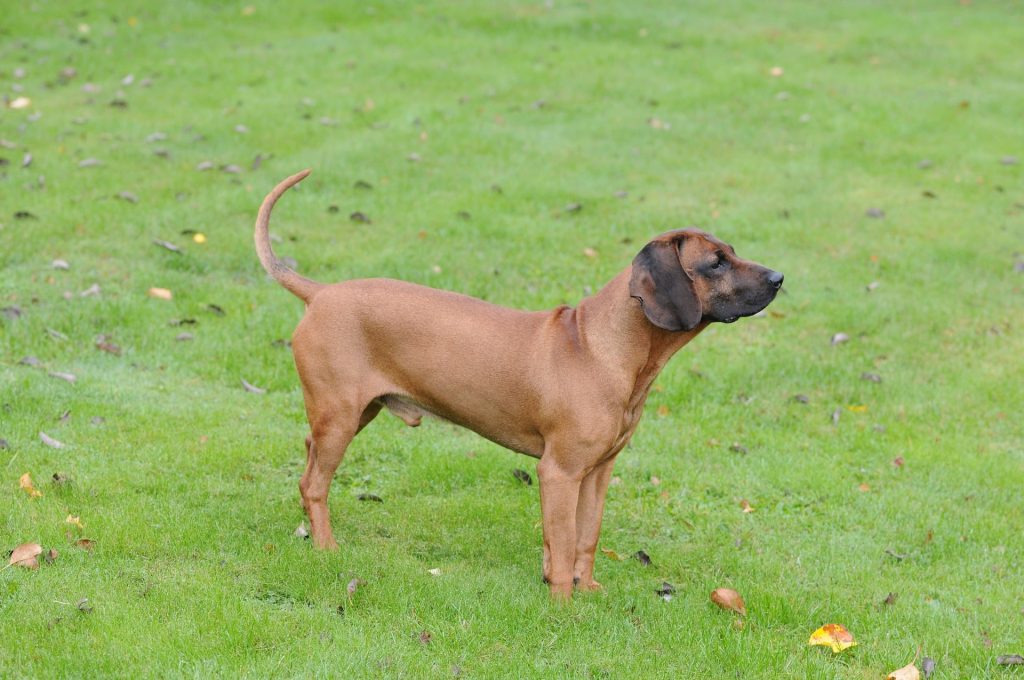
Size and Breed Category
The Bavarian Mountain Hound is a medium-sized breed of dog that originated in Germany. They are typically between 43-52 cm in height at the shoulder and weigh between 18-27 kg. Their coat is short and dense, with a black and tan coloration. They have a muscular build and a strong, athletic physique, which makes them well-suited for hunting and tracking.
The Bavarian Mountain Hound is classified as a scent hound, which means they have a keen sense of smell and are used for tracking game. They are a working breed and require plenty of exercise and mental stimulation to stay healthy and happy. They are known for their loyalty and intelligence, and make excellent companions for active families. However, they can be stubborn and independent, so early socialization and training is important. Overall, the Bavarian Mountain Hound is a versatile and capable breed that excels in a variety of roles.
Fur Length and Colour
The fur of the Bavarian Mountain Hound is short and dense, providing excellent protection against the harsh mountain climate. The fur is also water-resistant, allowing the dog to work in wet conditions without becoming soaked. The fur is typically a rich shade of red with black markings, although some dogs may have a lighter or darker coat. The black markings are usually found on the face, ears, and tail. The fur on the ears is slightly longer than the rest of the body, giving the dog a distinctive appearance. Overall, the fur of the Bavarian Mountain Hound is both functional and aesthetically pleasing.
The colour of the Bavarian Mountain Hound’s fur is an important characteristic of the breed. The red and black colouring is a result of selective breeding, with breeders aiming to produce dogs with a distinctive appearance that would be easy to spot in the mountains. The red colour is typically a deep shade, with some dogs having a slightly lighter or darker coat. The black markings are usually in the form of a saddle on the back, with black patches on the face, ears, and tail. The combination of red and black gives the dog a striking appearance that is both beautiful and functional. Overall, the colour of the Bavarian Mountain Hound’s fur is an important aspect of the breed’s identity.
Termperament and Trainability
Bavarian Mountain Hounds are known for their friendly and loyal temperament. They are affectionate towards their owners and are great with children. However, they can be reserved with strangers and may require proper socialization to prevent any aggressive behavior. These dogs are also highly intelligent and have a strong work ethic. They were originally bred for hunting and have a strong prey drive, which can make them difficult to train. However, with consistent and patient training, they can excel in obedience and agility.
The trainability of Bavarian Mountain Hounds can vary depending on the individual dog. Some may be more stubborn and independent, while others may be more eager to please their owners. They require a firm and consistent training approach, as they can become easily bored with repetitive exercises. Positive reinforcement techniques, such as treats and praise, can be effective in motivating these dogs during training. It is important to start training at a young age and to provide plenty of mental and physical stimulation to prevent any destructive behavior. Overall, Bavarian Mountain Hounds can make great companions for active and experienced dog owners who are willing to put in the time and effort to train them properly.
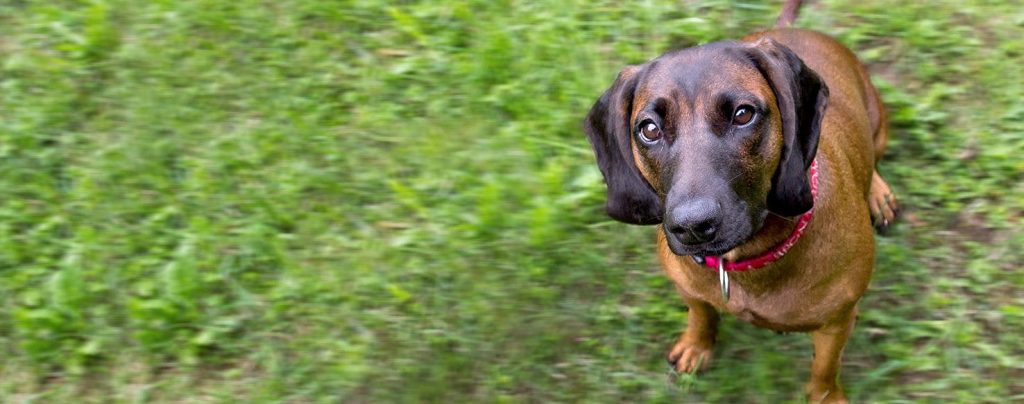
Known Health Conditions
Bavarian Mountain Hounds are prone to certain health conditions that owners should be aware of. One of the most common issues is hip dysplasia, which is a genetic condition that affects the hip joint. This can cause pain, lameness, and arthritis in the affected joint. Another condition that can affect this breed is bloat, which is a life-threatening condition where the stomach fills with gas and twists on itself. Symptoms include restlessness, drooling, and a distended abdomen. Immediate veterinary attention is required if bloat is suspected.
Additionally, Bavarian Mountain Hounds may be prone to ear infections due to their long, floppy ears that can trap moisture and debris. Regular cleaning and inspection of the ears can help prevent infections. This breed may also be at risk for certain eye conditions, such as cataracts and progressive retinal atrophy, which can lead to blindness. Regular eye exams by a veterinarian can help detect and manage these conditions. Overall, it is important for owners of Bavarian Mountain Hounds to be aware of these potential health issues and to work closely with their veterinarian to ensure their dog stays healthy and happy.
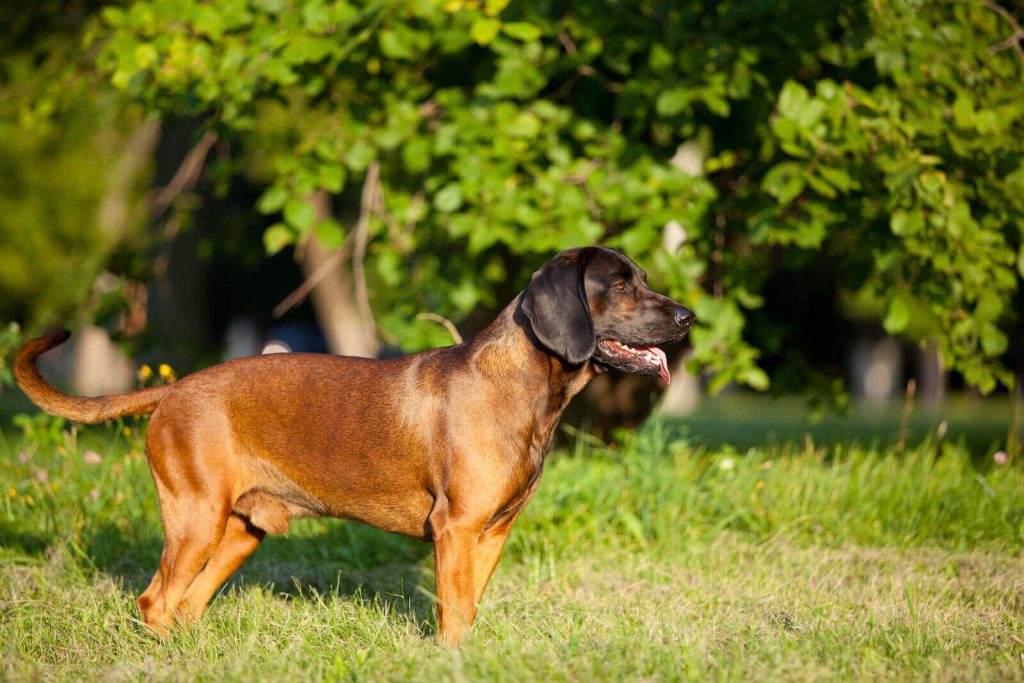
Openness to Strangers
Bavarian Mountain Hounds are known for their friendly and welcoming nature towards strangers. They are a breed that is always eager to meet new people and make new friends. This trait makes them excellent companions for families with children or those who frequently have guests over. Their open and sociable personality also makes them great candidates for therapy or service dogs. Bavarian Mountain Hounds are always ready to lend a paw and bring joy to those around them.
Their openness to strangers is not limited to humans, as Bavarian Mountain Hounds are also known to be friendly towards other animals. They are often used for hunting in packs, which requires them to work well with other dogs. This socialization with other canines has made them very tolerant and accepting of other dogs they may encounter. However, it is important to note that their hunting instincts may still kick in if they come across smaller animals such as cats or rabbits. Overall, the Bavarian Mountain Hound’s friendly and open nature makes them a beloved breed among dog owners and animal lovers alike.
Playfulness Level
The Bavarian Mountain Hound is a highly energetic and playful breed of dog. They are known for their love of outdoor activities and their ability to keep up with their owners on long hikes or runs. Their playful nature makes them great companions for families with children, as they enjoy playing games and running around in the yard. They are also known for their love of water and will happily splash around in a pool or lake.
This breed’s playful nature can sometimes lead to mischief, as they are known to be curious and adventurous. They may dig holes in the yard or chew on household items if they are not given enough exercise and stimulation. However, with proper training and plenty of playtime, the Bavarian Mountain Hound can make a wonderful addition to any active household. Their playful energy and love of adventure make them a great choice for those who enjoy spending time outdoors and want a loyal companion to join them on their adventures.
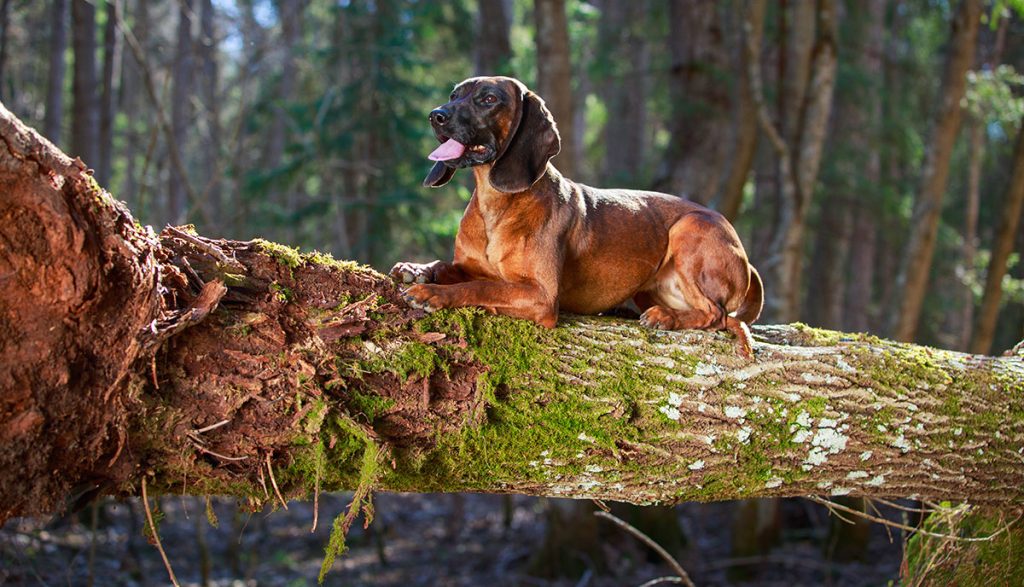
Suitability as a Pet for Children
Bavarian Mountain Hounds are a highly active breed, with a strong hunting instinct. They require plenty of exercise and mental stimulation to keep them happy and healthy. As such, they may not be the best choice for families with young children who may not be able to provide the necessary level of activity and attention. However, for families with older children who are able to keep up with their energy levels, the Bavarian Mountain Hound can make a loyal and affectionate pet. They are known for their intelligence and trainability, and can excel in activities such as obedience and agility.
Exercise Needs
Bavarian Mountain Hounds require a significant amount of exercise to maintain their physical and mental health. As a medium-sized breed, they need at least one hour of daily exercise, which can be achieved through long walks, runs, or hikes. These dogs have a strong hunting instinct and enjoy tracking scents, so activities that allow them to use their nose, such as scent work or tracking, can be particularly beneficial. Additionally, they are known for their endurance and stamina, so they can excel in activities that require sustained physical activity, such as agility or flyball.
In addition to physical exercise, Bavarian Mountain Hounds also benefit from mental stimulation. These dogs are intelligent and require mental challenges to prevent boredom and destructive behavior. Activities such as obedience training, puzzle toys, and interactive games can help keep their minds engaged. It is important to note that these dogs thrive on human interaction and should not be left alone for extended periods of time. Regular exercise and mental stimulation can help ensure that Bavarian Mountain Hounds are happy, healthy, and well-behaved companions.
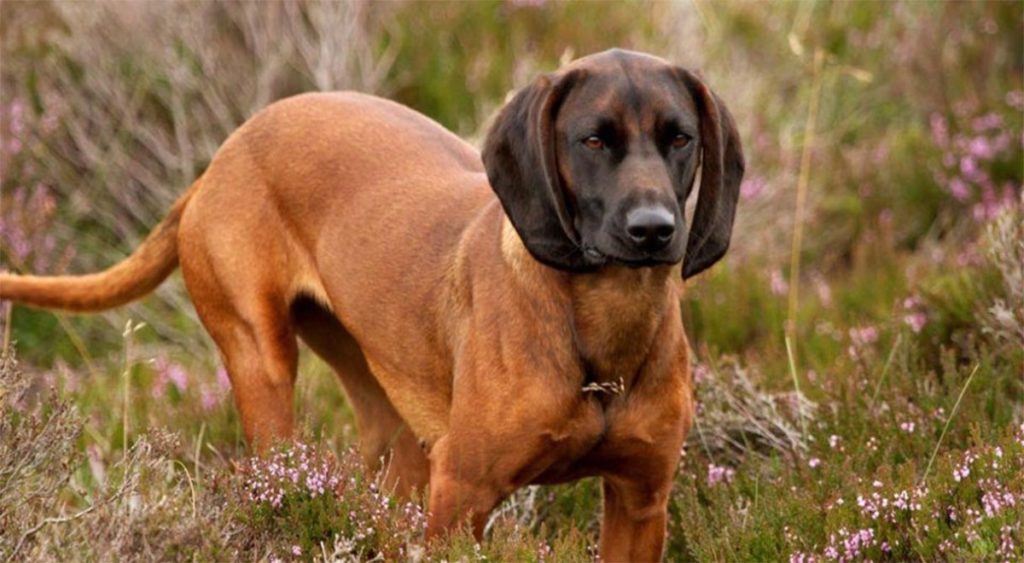
Suitability for a Multi-Pet Family
Bavarian Mountain Hounds have a reputation for being friendly towards other pets. They are known to get along well with other dogs and cats, as long as they are properly socialized from a young age. It is important to note that every dog is different, and some Bavarian Mountain Hounds may not be as accepting of other pets as others. However, with proper training and socialization, they can make great companions for other animals.
Housing Requirements
Bavarian Mountain Hounds require a spacious living environment that allows them to move around freely. They are an active breed that needs plenty of exercise, so a large garden or access to open countryside is essential. A secure fence is also necessary to prevent them from wandering off on their own. Inside the house, they need a comfortable bed to rest on and enough space to move around. They are not particularly fond of being left alone for long periods, so it is important to provide them with plenty of toys and mental stimulation to keep them occupied.
In terms of nutrition, Bavarian Mountain Hounds require a balanced diet that meets their energy needs. They are prone to obesity, so it is important to monitor their food intake and provide them with regular exercise. They also need access to fresh water at all times. Grooming requirements are minimal, with occasional brushing to remove loose hair and keep their coat shiny. Regular vet check-ups are recommended to ensure their overall health and well-being.
Summary
The Bavarian Mountain Hound has a strong hunting instinct and requires plenty of exercise and mental stimulation. They are loyal and affectionate towards their owners but can be reserved with strangers. Due to their high energy levels and need for activity, they may not be suitable for apartment living or for owners who cannot commit to regular exercise and training.
Bavarian Mountain Hound Dog FAQS
Bavarian Mountain Hounds are intelligent and eager to please, making them relatively easy to train with consistent and positive reinforcement.
Yes, Bavarian Mountain Hounds are known to be good with children and make great family pets.
Bavarian Mountain Hounds can get along with other pets if socialized properly from a young age.
Bavarian Mountain Hounds are generally healthy, but can be prone to hip dysplasia and ear infections. Regular vet check-ups are recommended.
Yes, Bavarian Mountain Hounds shed moderately and require regular grooming.
Bavarian Mountain Hounds have a lifespan of 10-14 years.
Bavarian Mountain Hounds are an active breed and require at least 1-2 hours of exercise per day.
Bavarian Mountain Hounds grow to be between 47-52 cm tall.
The average weight of a Bavarian Mountain Hound is between 20-30 kg.
Bavarian Mountain Hounds are loyal, affectionate, and energetic dogs that make great companions for active families.
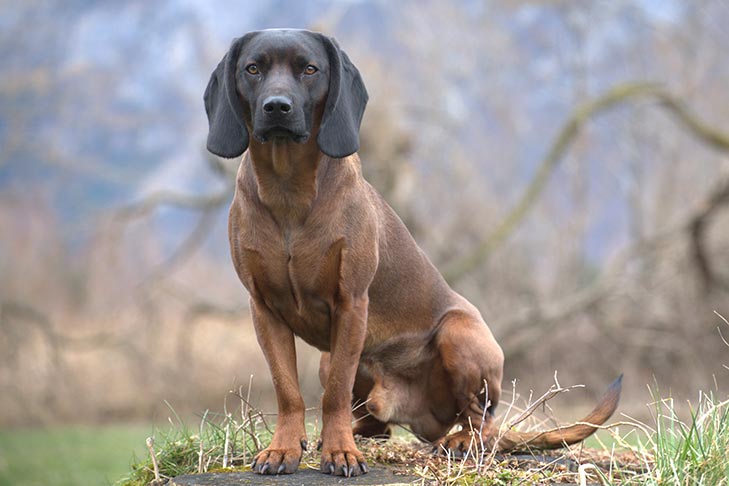
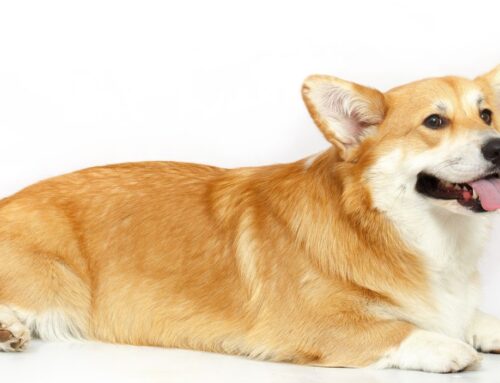
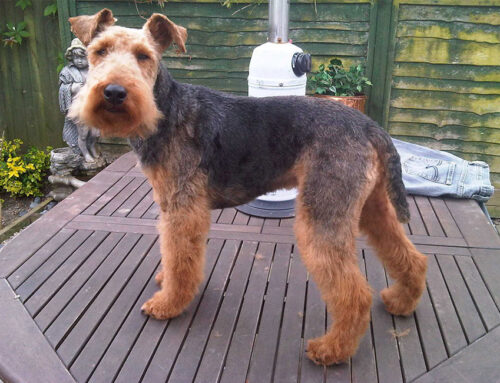
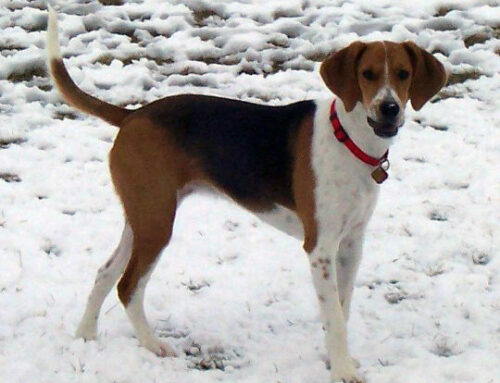
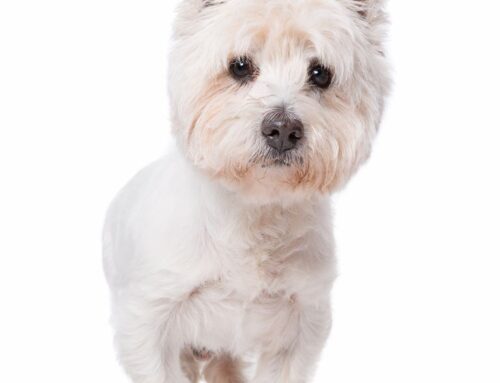
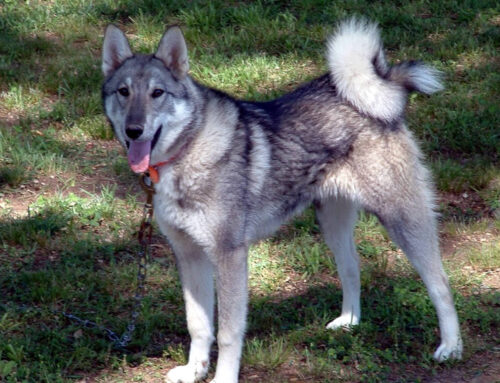
Leave A Comment